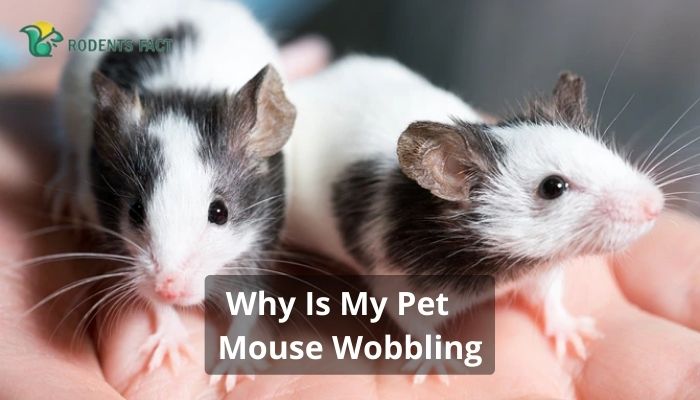The Alarming Reasons Why Is My Pet Mouse Wobbling
Due to their vibrant personalities and activities, mice make excellent pets for homes. Monitoring them for a variety of potential health issues is critical since many of them may be treated if discovered in the early stages.
So, why is my pet mouse wobbling?

Our pets, like us, are prone to illness from time to time. Even the tiniest mice may get ill, although it is difficult to tell. An illness might range from something as mild as an allergy to something as serious as cancer that causes wobble in the mice.
In order to scratch a little itch, your mouse may tilt its head. However, when they do this often, it might indicate a more serious condition. One of the symptoms of an ear infection is twitching of the head. Your mouse may potentially be suffering from ear bugs or a skin condition.
Common Illnesses in Pet Mice
Stress, anxiety, or excitement might cause your pet mouse to wobble. When a female mouse is in heat, it may wobble, wriggle its ears, and arch its back.

If you are in an unfamiliar environment, you may notice that your mouse begins to tremble. Take your pet to the doctor immediately if he or she begins to shake in a way that mimics seizures.
With symptoms, therapy, and some tips for prevention, we have compiled a list of common ailments in pet mice.

Cold
Human colds frequently go away on their own, and mice do as well. Symptoms include watery eyes, sneezing, shivering, and exhaustion, much as they do in people
Maintain a clean and dry cage with enough fresh food and water. Do not leave the cage in the sun or in an area where it will become too hot.
Hamsters can also be cold and wobbly. Make sure the temperature is never too hot or too cold for your mouse or hamster.
Salmonella Poisoning
Diarrhea, tremor, dehydration, and a lack of appetite are just a few of the symptoms. Instead of the normal black feces, diarrhea may present as wet, off-colored stool.
A little eyedropper will help your mouse take up all the water it can if the infection does arise. The presence of a caring owner will lessen the mouse’s anxiety, so never leave it alone. We would all prefer not to be sick all by ourselves if we can help it.

Diarrhea
Diarrhea generally results from anxiety, too much food, salmonella, an upset stomach, or constipation clearing. Older mice often have it. Ensure your mouse is well-hydrated. Dehydration may kill in hours.
Diarrhea normally clears up on its own; if it lasts longer than two days, see a vet. Clean and pamper your mouse. Always have fresh food and water. Relax.

Skin Allergies
Mice are often allergic to wood shavings from pet stores. These shavings may be dusty after sitting for a long time, or whether they are inexpensive, they may not have been properly handled.
Dry meadow and dusty hays might irritate mice’s eyes, wounds, and skin. Vanilla, hamster feeds, fresh meals, and herb-based diets may induce allergies in mice.
What You Can Do
Minimum 4-week mouse quarantine. When you get a new mouse, isolate it.
This lets you monitor for indicators of disease. It protects other mice against an ‘invisible’ sickness.

Weekly cage cleaning is required. Remove the mouse from its cage. Soak plates and bowls in soapy water. Use a moist sponge to clean the old cage.
After cleaning the cage, sterilize it with 1 gallon of bleach plus 1 tablespoon of bleach. Dry the cage before putting the mouse back in.
Healthy mouse food. A well-fed mouse can better fend off disease.
Supplement pellets with apples or broccoli. Grains as snacks are unhealthy and might induce weight gain.
Front teeth should be trimmed. There is no limit on how long the front teeth of a mouse may continue to grow.

This may cause oral infections when bacteria invade the gum tissue. Have your vet trim your mouse’s teeth during yearly checkups to avoid this.
Cool an overheated mouse. Mice are vulnerable to high temperatures because their feet and tails absorb it.
If you are sweating, place a fan nearby your mouse’s cage or turn the air conditioner down. Lethargy, panting, weak breathing, and shivering are overheated mouse symptoms.
Frequently Asked Questions
1. What’s Wrong With My Pet Mouse?
Skin and hair diseases are frequent in pet mice. Infections, parasites, or inappropriate cage mates may cause skin irritation and hair loss.
2. Why Is My Pet Mouse Vibrating?
The ‘vibration’ or ‘purring’ is tooth grinding to avoid overgrowth. Rodents’ front teeth develop continuously.

Final Words
This answers your most asked question, “why is my pet mouse wobbling.”
Your pet mouse may wobble if it is experiencing any kind of worry, excitement, or stress. Female mice in heat wobble, wiggle their ears and arch their backs.
Mice are nocturnal animals that are very active, particularly females. Mice will frequently mask their diseases so their predators do not see them as vulnerable or easy prey. In extreme cases, wobbling might potentially result in death. Providing proper care for your mice may save them from dying.




